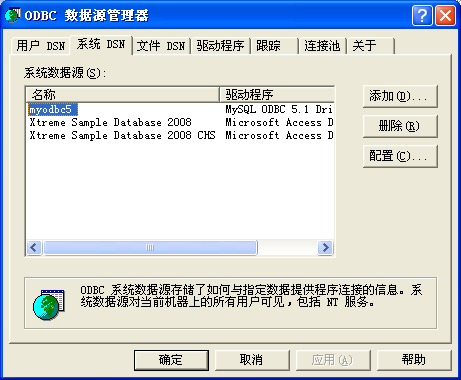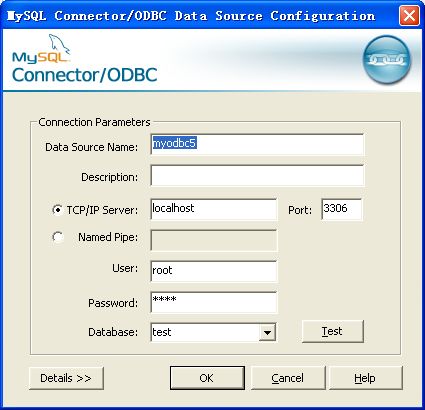otl通过myodbc连接mysql
Otl简介
OTL 是 Oracle,Odbc andDB2-CLI Template Library 的缩写,是一个C++编译中操控关系数据库的模板库,它目前几乎支持所有的当前各种主流数据库,例如Oracle,MS SQL Server,Sybase,Informix,MySQL,DB2,Interbase /Firebird,PostgreSQL,SQLite,SAP/DB,TimesTen,MS ACCESS等等。OTL中直接操作Oracle主要是通过Oracle提供的OCI接口进行,进行操作DB2数据库则是通过CLI接口来进行,至于MS的数据库和其它一些数据库,则OTL只提供了ODBC来操作的方式。当然Oracle和DB2也可以由OTL间接使用ODBC的方式来进行操纵。
Myodbc
因为otl只能通过odbc连接mysql,所以首先需要安装myodbc,myodbc官网下载地址:http://www.mysql.com/downloads/connector/odbc/,根据自己的电脑下载,我下载的是
Connector/ODBC5.1.10, Windows (x86, 32-bit), MSI Installer Connector-ODBC,然后安装即可,点击默认安装就行了。
添加数据源
打开控制面板-》点击管理工具-》点击数据源,然后添加数据源
打开ODBC数据源管理器对话框,如下图所示:
1. 打开ODBC数据源管理器。(注:在64位系统中装32的mysql和odbc,启动C:\Windows\SysWOW64\odbcad32.exe)
2. 在ODBC数据源管理器对话框中,点击“添加”。打开“创建新数据源”对话框。
3. 选择MySQL ODBC 5.1驱动程序,然后点击“完成”。打开“MySQLODBC 5.1驱动程序-DSN配置”对话框,如下图所示:
4. 在“数据源名”框中,输入打算访问的数据源的名称。它可以是你选择的任何有效名称。
5. 在“描述”框中,输入DSn所需的描述信息。
6. 在“主机”或“服务器名”(或IP)框中,输入准备访问的MySQL服务器主机的名称。默认情况下为localhost(本地主机)。
7. 在“数据库名”框中,输入准备用作默认数据库的MySQL数据库名称。
8. 在“用户”框中,输入你的MySQL用户名(数据库用户ID)。
9. 在“密码”框中输入密码。
10.在“端口”框中,如果端口不是默认端口,输入端口号。
11.选择一个数据库吧
点击ok,添加数据源完毕。
12.修改字符集名称,否则会出现乱码
下载otl
http://otl.sourceforge.net/otl3_down.htm下载地址,
下载头文件即可。
测试一下
当然首先要把otl头文件拷贝到工程目录,链接的时候要用,下面是一个简单的测试代码,如果刚才选择了一个数据库的话,就在当前的数据库中添加了一个表;
#include <iostream>
using namespace std;
#include <stdio.h>
#define OTL_ODBC // CompileOTL 4.0/ODBC
// Thefollowing #define is required with MyODBC 5.1 and higher
#define OTL_ODBC_SELECT_STM_EXECUTE_BEFORE_DESCRIBE
#define OTL_UNICODE // CompileOTL with Unicode
#include "otlv4.h"// include the OTL 4.0 header file
otl_connect db; // connect object
void insert()
// insert rowsinto table
{
otl_stream o(1, //buffer size should be == 1 always on INSERT.
"insertinto test_tab values(:f1<int>,:f2<char[5]>)",
// SQLstatement, char[5] means 5 2-byte
// Unicodecharatcters including a null
// terminator
db // connectobject
);
unsigned short tmp[32]; // Nullterminated Unicode character array.
for(int i=1;i<=100;++i){
o<<i;
tmp[0]=1111; //Unicode character (decimal code of 1111)
tmp[1]=2222; //Unicode character (decimal code of 2222)
tmp[2]=3333; //Unicode chracater (decimal code of 3333)
tmp[3]=4444; //Unicode chracater (decimal code of 4444)
tmp[4]=0; //Unicode null terminator
o<<(unsignedchar*)tmp;
// overloadedoperator<<(const unsigned char*) in the case of Unicode
// OTL acceptsa pointer to a Unicode character array.
//operator<<(const unsigned short*) wasn't overloaded
// in order toavoid ambiguity in C++ type casting.
}
}
void select()
{
otl_stream i(50, //buffer size
"select* from test_tab "
"wheref1>=:f11<int> "
" and f1<=:f12<int>*2",
// SELECTstatement
db // connectobject
);
// create selectstream
int f1;
unsigned short f2[32];
i<<8<<8; // assigning :f11 = 8, f12 = 8
// SELECTautomatically executes when all input variables are
// assigned. Firstportion of output rows is fetched to the buffer
while(!i.eof()){// while not end-of-data
i>>f1;
i>>(unsignedchar*)f2;
// overloaded operator>>(unsignedchar*) in the case of Unicode
// OTL acceptsa pointer to a Unicode chracter array.
//operator>>(unsigned short*) wasn't overloaded
// in order toavoid ambiguity in C++ type casting.
cout<<"f1="<<f1<<", f2=";
for(int j=0;f2[j]!=0;++j)
cout<<""<<f2[j];
cout<<endl;
}
i<<4<<4; // assigning :f11 = 4, :f12 = 4
// SELECTautomatically executes when all input variables are
// assigned. Firstportion of output rows is fetched to the buffer
while(!i.eof()){// while not end-of-data
i>>f1>>(unsigned char*)f2;
cout<<"f1="<<f1<<", f2=";
for(int j=0;f2[j]!=0;++j)
cout<<""<<f2[j];
cout<<endl;
}
}
int main()
{
otl_connect::otl_initialize(); // initialize the database API environment
try{
db.rlogon("root/root@myodbc5");// connect to the database
otl_cursor::direct_exec
(
db,
"droptable test_tab",
otl_exception::disabled // disable OTL exceptions
); // droptable
otl_cursor::direct_exec
(
db,
"createtable test_tab(f1 int, f2 varchar(11))"
); // create table
insert(); //insert records into table
select(); //select records from table
}
catch(otl_exception&p){ // intercept OTL exceptions
cerr<<p.msg<<endl; // print out error message
cerr<<p.stm_text<<endl; // print out SQL that caused the error
cerr<<p.var_info<<endl; // print out the variable that caused the error
}
db.logoff(); //disconnect from the database
getchar();
return 0;
}
要注意的是更改db.rlogon("root/root@myodbc5");// connect to the database
其中的数据库的用户名和密码,还有数据源的名称。
运行的结果
f1=8, f2= 1111 2222 3333 4444
f1=9, f2= 1111 2222 3333 4444
f1=10, f2= 1111 2222 3333 4444
f1=11, f2= 1111 2222 3333 4444
f1=12, f2= 1111 2222 3333 4444
f1=13, f2= 1111 2222 3333 4444
f1=14, f2= 1111 2222 3333 4444
f1=15, f2= 1111 2222 3333 4444
f1=16, f2= 1111 2222 3333 4444
f1=4, f2= 1111 2222 3333 4444
f1=5, f2= 1111 2222 3333 4444
f1=6, f2= 1111 2222 3333 4444
f1=7, f2= 1111 2222 3333 4444
f1=8, f2= 1111 2222 3333 4444




